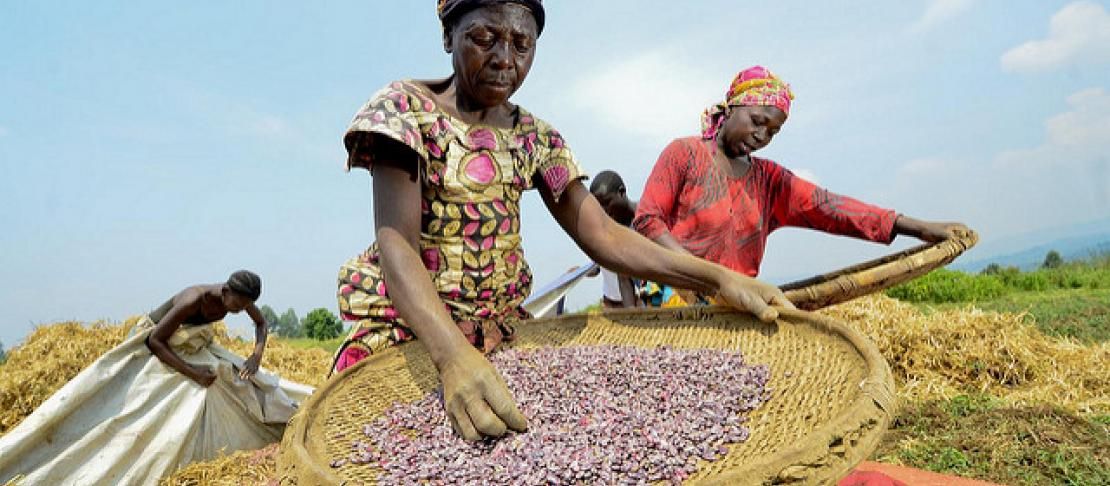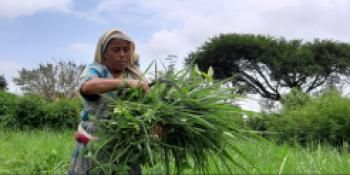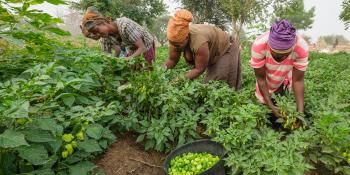Stocktaking of gender and climate change initiatives in Africa

As African countries develop climate change policies and programs, it is critical to make gender equitable plans in mitigation and adaptation actions.
Across Africa, the changing climate adversely impacts the lives and livelihoods of women, men, and their families. Due to gender-based roles in society, and the inequities caused by them, the climate affects women, men, and the young differently, resulting in various levels of vulnerability. African countries, with support from development organizations, the private sector, and civil society, are enacting climate adaptation and mitigation policies, strategies, and programs to build resilience, including a greater investment in women.
The CGIAR Research Program on Climate Change, Agriculture and Food Security (CCAFS) with its partners, the African Working Group on Gender and Climate Change (AWGGCC), Women in Global Science and Technology (WISAT), and the World University Service of Canada (WUSC), brought African climate change negotiators together on 13 November 2017 on the sidelines of the Conference of Parties (COP23), held in Bonn, Germany. The goal of the event was to dialogue the gender aspects of existing global, regional, and national climate change commitments.
Objectives included (a) a discussion of gender issues under the United Nations Framework Convention on Climate Change (UNFCCC) processes and the implication for Africa; (b) updates on the African Union’s decision on the gender and women programme from the Committee of African Heads of State and Government on Climate Change (CAHOSCC); (c) an introduction to tools and guidelines to mainstream gender; and (d) a review of the 47th subsidiary Body of Implementation (SBI) decision on the Gender Action Plan (GAP) to identify and propose strategies and opportunities for implementation in Africa.
Approximately 30 African negotiators, including both men and women, attended. Ms. Stella Gama (Malawi) and Ms. Priscilla Achakpa (Nigeria), both members of the African Group of Negotiators (AGN), AWGGCC, and chief negotiators on Gender and Climate Change, delivered presentations on gender issues in the UNFCCC process and case studies on gender integration in African climate change legislation and strategies.
According to Ms. Gama, the UNFCCC process acknowledges gendered climate impacts and proposes gender-responsive climate actions. For example, the Paris Agreement recognizes gender and human rights as key considerations in all climate actions. UNFCCC Decision 23/CP18 promoted gender responsive action by making gender and climate change a standing item on the COP agenda of sessions. The UNFCCC secretariat is mandated to maintain information on the gender composition of constituted bodies established under the Convention and the Kyoto Protocol.
Additionally, Decision 18/CP20, the most celebrated Lima Work Programme on gender, established a two-year work programme for promoting gender balance and achieving gender-responsive climate policy to guide the effective participation of women in the bodies established under the UNFCCC. In Decision 21/CP22, the COP extended the Lima Work Programme..
During COP23, the GAP, which calls for gender-responsive climate policy to be included in all climate-related activities and decisions as well as the “inclusion of women at all levels of UNFCCC processes,” was endorsed.
Ms. Achakpa highlighted a study that reviewed gender-responsiveness in climate change legislation and programs for six African countries (Nigeria, Ghana, Kenya, Tanzania, Uganda, and Ethiopia) and outlined seven steps as a minimum criteria for a gender-responsive climate change policy or strategy, including:
- Gender research and analysis must be evidence-based
- Positive social and gender norms
- Equal benefits to women and youth
- Participation of all groups
- Adaptation and mitigation actions respond to the need of vulnerable groups
- Strategic planning and implementation
- Monitoring and evaluation incorporates feedback from women and youth
Dr. Sophia Huyer, of Women in Global Science and Technology (WISAT) and CCAFS, presented tools and guidelines to mainstream gender into climate change actions, including the building blocks and entry points for gender-responsive, nationally determined contributions adopted from the United Nations Development Programme (UNDP). The building blocks include (a) national analysis and consultations that involve sectoral analyses, multi-stakeholder workshops, and consultations, and the development of sex-disaggregated data and indicators in the national policy and legal environment; (b) establishment of institutional frameworks and coordinated mechanisms to provide context and channels for the integration of gender into climate planning and policy processes and bodies; (c) alignment of policy/planning/national instruments such as National Adaptation Plans (NAPs), National Agricultural Mitigation Actions (NAMAs), Low Emissions Development (LEDs), and NDCs; and (d) the development of a monitoring system for key climate change sectors to monitor the results of gender mainstreaming and social co-benefits.
The entry points for integrating gender into climate change policy include (a) analyzing the national context for gender trends and sex-disaggregated data; (b) assessing institutional gender equality frameworks and coordination mechanisms; (c) integrating gender equality into climate change policy and planning; (d) engaging multiple stakeholders; (e) supporting capacity development; (f) monitoring and evaluation; and (g) gender responsive climate finance mechanisms.
Issues associated with integrating gender into climate change were discussed as was proposed steps forward:
- Support the AWGGCC to become the think tank of gender and climate change at the African level to continue backstopping the African Group of negotiators (AGN) during negotiations.
- Capacity building and training require urgent attention in Africa.
- Parties require simplified guidelines to integrate gender into policy and decision making processes.
- Women-specific, targeted interventions must be designed to bring more women into the decision-making process. However, we must go beyond numbers to make the participation of women meaningful.
- Gender integration must help parties generate bankable projects to address gender diversity on the African continent.
Further readings
- UNFCCC resources on Gender and Climate Change
- Climate Change Act: Ghana; Kenya; Uganda; Tanzania;
- Climate Smart Agriculture Frameworks: Uganda: Kenya: Tanzania
- National Adaptation plans: Kenya; Ethiopia; Nigeria; Tanzania;
- National Determined Contributions: Ghana; Kenya: Uganda; Tanzania; Nigeria; Ethiopia
Mary Nyasimi is a Science Officer with the CGIAR Research Program on Climate Change, Agriculture and Food Security (CCAFS) and Winfred Lichuma is the Chairperson of the National Gender and Equality Commission and the Secretariat of the African Working Group on Gender and Climate Change.



